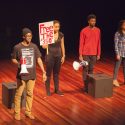Wisconsin Film Festival 2006: Education through cinema
Five little film festivals – four of them global in scope – and three competitions will comprise the eighth annual Wisconsin Film Festival, Thursday-Sunday, March 30-April 2.
“We think the educational value of this year’s festival is absolutely excellent,” says Susan Cook, executive director of the UW–Madison Arts Institute, which has sponsored the event since its inception. “We’re especially excited to be working with the UW–Madison Asian American Studies Program, the Language Institute, Global Studies, the Center for Jewish Studies and the European Studies Alliance to bring some of the country’s and the world’s best cinema to Madison.”
Adds Cook: “Film is a visual medium, of course, and these partnerships provide an unparalleled opportunity to show both the outside of other cultures and what’s underneath in terms of values and beliefs.”
Insights into various aspects of American culture will be under the lens too, as the American Cinema component offers a glimpse at what makes the national psyche tick. Sometimes, the view can be disturbing. For example, “The Murder of Fred Hampton” (1971) tells the story of Hampton, a Black Panther organizer who was gunned down by police as he slept. Hampton was 21. The film follows the last year of his life and aftermath of his death.
Murder – or its possibility – also factor into the Quay Brothers’ “The Piano Tuner of Earthquakes” (2005), part of the Contemporary World Cinema mini-fest of award-winners from around the globe. The American expatriate twins, now working in Britain, fashion a macabre world in which an opera diva mysteriously disappears. A piano tuner summoned to service odd automatons finds himself in the position of uncovering a terrifying truth.
“Innocence” (2004) and its opposite, also factor into Lucile Hadzihalilovic’s film, produced in France. Based on Frank Wedekind’s story, the action is set at a girls’ school sequestered deep in a forest, where students live in small groups, distinguished by their various colored hair ribbons. Subterranean tunnels gird them, and the children disappear – somewhere – at night.
Another take on innocence and guilt plays out in “Almost Brothers,” (2004) a Brazilian film by Lucia Murat, part of the traveling Global Lens Series. Selected from international film festivals, the pictures have been chosen for their ability to raise cultural awareness as well as for their aesthetic and thematic excellence. This one finds two Rio boys in the notorious Ilha high security prison. One is doing time for political activism, the other for drug dealing.
Political activism of a less idealistic sort falls under the watchful eye of Rachel Boynton in “Our Brand is Crisis” (2005). Former advisor to Bill Clinton James Carville signs on to doctor the spin of Bolivian presidential candidate Gonzales Sanchez de Lozada. The ensuing campaign erupts in violence. “Our Brand” is included in the festival’s Global Visions segment, portraying contemporary instances of globalization.
Vietnam-born director Ham Tran looks at the global roots of his own family history in “Journey from the Fall” (2005). In it, some of the family members separated after the fall of Saigon escape to the United States. Called a “Schindler’s List” for the Vietnamese Diaspora, the film opens avenues to dialogue so that people can begin to understand their own family histories, Ham says.
“Journey” is part of the Asian American Film series, “Y’all Gonna Learn Chinese,” sponsored by the UW–Madison Asian American Studies Program. Its director, Leslie Bow, associate professor of English, says that the purpose of the series – and quite possibly, of the entire festival – is getting audiences to rethink what they think.
“In our case, we chose the shorts and feature-length films in the series in part because of the way that they challenge and play with ideas that the dominant culture promotes about Asians. These films expand our vision of what is ‘Asian’ and ‘American,'” Bow says.
Or what is “European,” “African” or “Middle Eastern.” What it means to be human, Cook says.
“Film is such a powerful medium,” says Cook, herself a musicologist. “When you watch a movie, no matter what it’s about or where it’s from, you cannot help but come away with a greater understanding of who you are and what you’re made of. The interdisciplinary nature of film suits it particularly well to the university’s mission.”
This year’s festival also presents a wonderful opportunity for outreach, according to Vance Kepley, professor of communication arts and chair of the department, which, he says, has been an ardent supporter of the festival.
“It’s such an opportunity for campus-community cooperation,” he says. “Meg Hamel, the festival’s interim director, has done a remarkable job of coordinating and motivating staff and volunteers. The result is that the festival makes literal the connection between the university and broader community during the days and nights that the festival is underway.”
The film festival also gives its audiences an interactive component with the second annual Steep and Brew Audience Award. Filmmakers with Wisconsin ties have entered the Wisconsin’s Own Competition, and students from Wisconsin, even those attending schools in other places, submitted films to the Student Shorts Competition.
In addition, Chicago Sun-Times Pulitzer Prize-winning film critic Roger Ebert and “Chronicles of Narnia” producer Mark Johnson, supported through the Anonymous Fund, are scheduled for the festival. Ebert will introduce Otto Preminger’s 1944 classic “Laura” and sign copies of the new book, “The Great Movies II” (Broadway Books, 2006) on Saturday, April 1 at noon at the University Book Store on State Street.
Johnson will introduce “The Wendell Baker Story,” about an ex-convict employed in a retirement community. Brothers Luke and Andrew Wilson directed.
A complete schedule will be online Wednesday, March 1. Tickets go on sale Saturday, March 4 at the online address, or at the Wisconsin Union Theater Box Office, (877) 963-FILM.
Tags: arts, diversity, international


